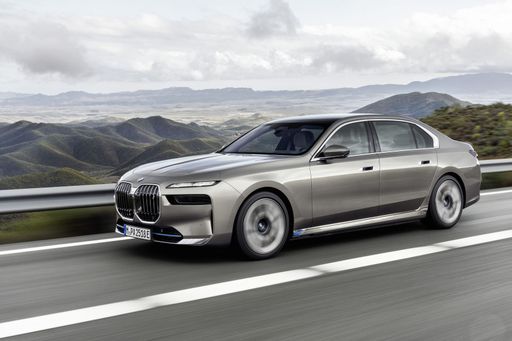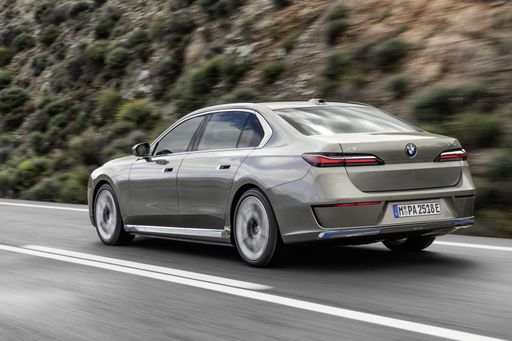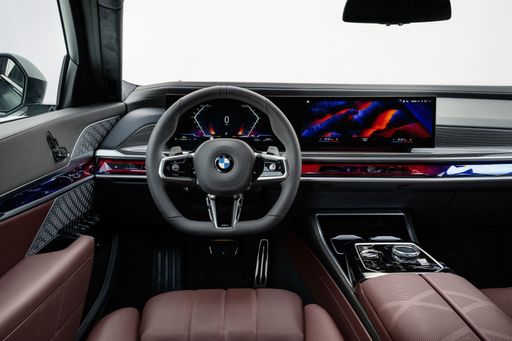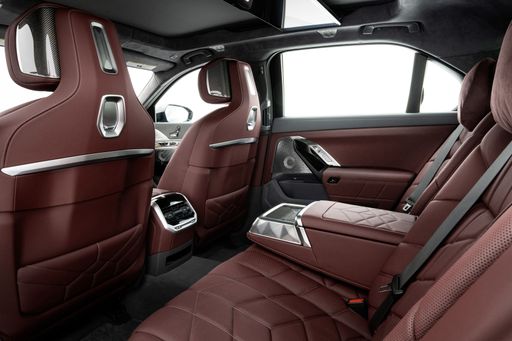BMW i7 vs Nissan Interstar – Differences & prices compared
Compare performance, boot space, consumption and price in one view.
Find out now: which car is the better choice for you – BMW i7 or Nissan Interstar?
The BMW i7 (Sedan) comes with a Electric engine and Automatic transmission. In comparison, the Nissan Interstar (Cargo Van) features a Diesel or Electric engine with Manuel or Automatic transmission.
When it comes to boot capacity, the BMW i7 offers 500 L, while the Nissan Interstar provides – depending on how much space you need. If you’re looking for more power, decide whether the 659 HP of the BMW i7 or the 170 HP of the Nissan Interstar suits your needs better.
In terms of consumption, the values are 18.50 kWh per 100 km for the BMW i7, and 7.40 L for the Nissan Interstar.
Price-wise, the BMW i7 starts at 99200 £, while the Nissan Interstar is available from 34900 £. Compare all the details and find out which model fits your lifestyle best!
BMW i7
The new BMW i7 epitomises luxury and innovation, seamlessly blending advanced technology with elegant design. Its interior offers an unparalleled experience, with premium materials and cutting-edge features that create a tranquil yet engaging atmosphere for both driver and passengers. The i7's performance is both dynamic and efficient, demonstrating BMW's commitment to sustainable driving without compromising on the exhilarating drive the brand is known for.
details @ press.bmwgroup.com
@ press.bmwgroup.com
 @ press.bmwgroup.com
@ press.bmwgroup.com
 @ press.bmwgroup.com
@ press.bmwgroup.com
 @ press.bmwgroup.com
@ press.bmwgroup.com
Nissan Interstar
The Nissan Interstar is a versatile van that expertly combines practicality with modern design. It offers a spacious interior that caters to both cargo and passenger needs, making it ideal for businesses and families alike. With its robust performance and efficient fuel consumption, the Interstar stands out as a reliable choice in the commercial vehicle market.
details

|
|
|
|
|
Costs and Consumption |
|
|---|---|
|
Price
99200 - 157000 £
|
Price
34900 - 55600 £
|
|
Consumption L/100km
-
|
Consumption L/100km
7.4 - 7.5 L
|
|
Consumption kWh/100km
18.5 - 20.8 kWh
|
Consumption kWh/100km
-
|
|
Electric Range
559 - 624 km
|
Electric Range
175 - 410 km
|
|
Battery Capacity
101.70 kWh
|
Battery Capacity
-
|
|
co2
0 g/km
|
co2
0 - 195 g/km
|
|
Fuel tank capacity
-
|
Fuel tank capacity
80 L
|
Dimensions and Body |
|
|---|---|
|
Body Type
Sedan
|
Body Type
Cargo Van
|
|
Seats
5
|
Seats
3 - 7
|
|
Doors
4
|
Doors
4
|
|
Curb weight
2595 - 2770 kg
|
Curb weight
2053 - 2535 kg
|
|
Trunk capacity
500 L
|
Trunk capacity
-
|
|
Length
5391 mm
|
Length
5680 - 6315 mm
|
|
Width
1950 mm
|
Width
2080 mm
|
|
Height
1544 mm
|
Height
2498 - 2756 mm
|
|
Payload
480 - 535 kg
|
Payload
965 - 1447 kg
|
Engine and Performance |
|
|---|---|
|
Engine Type
Electric
|
Engine Type
Diesel, Electric
|
|
Transmission
Automatic
|
Transmission
Manuel, Automatic
|
|
Transmission Detail
-
|
Transmission Detail
Manual Gearbox, Automatic Gearbox, Reduction Gearbox
|
|
Drive Type
Rear-Wheel Drive, All-Wheel Drive
|
Drive Type
Front-Wheel Drive
|
|
Power HP
455 - 659 HP
|
Power HP
105 - 170 HP
|
|
Acceleration 0-100km/h
3.7 - 5.5 s
|
Acceleration 0-100km/h
-
|
|
Max Speed
205 - 250 km/h
|
Max Speed
115 - 177 km/h
|
|
Torque
650 - 1100 Nm
|
Torque
300 - 380 Nm
|
|
Number of Cylinders
-
|
Number of Cylinders
4
|
|
Power kW
335 - 485 kW
|
Power kW
77 - 125 kW
|
|
Engine capacity
-
|
Engine capacity
1997 cm3
|
General |
|
|---|---|
|
Model Year
2022 - 2023
|
Model Year
2024 - 2025
|
|
CO2 Efficiency Class
A
|
CO2 Efficiency Class
G, A
|
|
Brand
BMW
|
Brand
Nissan
|
BMW i7
The Pinnacle of Electric Luxury: BMW i7
Introducing the BMW i7, the latest in electric innovation from one of the world's premier automobile manufacturers. Blending cutting-edge technology with luxurious comfort, the i7 represents a significant leap forward in the electric vehicle (EV) market. This article delves into the technical specifications and innovative features that set the BMW i7 apart from its competitors.
Powerful Electric Performance
Under the sleek exterior of the BMW i7 lies a powerhouse of electric capabilities. Depending on the model configuration, the i7 offers between 455 and 660 PS, with a torque of up to 1100 Nm. This ensures an exhilarating driving experience, whether you choose the rear-wheel drive or all-wheel drive configuration. The acceleration is equally impressive, with the i7 capable of going from 0 to 100 km/h in just 3.7 to 5.5 seconds.
Efficient Energy Consumption
The efficiency of the BMW i7 is noteworthy, with an energy consumption ranging from 18.5 to 20.8 kWh/100 km. This efficiency, combined with a substantial battery capacity of 101.7 kWh, gives the i7 an electric range of between 559 and 623 kilometres. BMW’s commitment to sustainability is further underscored by its zero CO2 emissions, reinforcing its status as a premium yet environmentally conscious choice.
Sophisticated Interior and Technology
Inside, the BMW i7 is the epitome of luxury. With seating for five, the interior exudes elegance and comfort. Advanced technology is at your fingertips with features such as the latest iDrive system, providing seamless connectivity and enhanced control over vehicle functions. The i7 ensures you travel in style with its sophisticated Design Pure Excellence, M Sport package, and M Sport package Pro interior trims.
Dimensions and Capacity
The i7’s ample dimensions – with a length of 5391 mm, width of 1950 mm, and height of 1544 mm – are matched by its generous luggage capacity of 500 litres, ensuring practicality alongside luxury. The car's robust build is complemented by a payload capacity of between 480 to 535 kg, ensuring the i7 is as functional as it is stylish.
Cost and Efficiency
With prices ranging from €115,700 to €181,800, the i7 is positioned as a high-end vehicle offering value through its advanced features and performance. The monthly operating costs range between €2,143 and €3,027, while the cost per kilometre is approximately 85.7 to 121.1 cents. Despite its upscale market positioning, the i7 offers competitive efficiency with its remarkable CO2 emission-free driving and energy-saving technologies.
Conclusion
The BMW i7 stands as a testament to the brand’s innovation and dedication to sustainable luxury. By marrying performance, efficiency, and cutting-edge technology, BMW has ensured that the i7 not only meets but exceeds the expectations of discerning EV enthusiasts. The i7 is not merely a car; it is a statement of intent in the future of sustainable luxury. Experience the future today with the BMW i7.
Nissan Interstar
The Evolution of the Nissan Interstar
The Nissan Interstar has long been a staple in the commercial vehicle sector, known for its robust build and practical design. The latest iterations have further cemented its status with a range of technical enhancements and innovative features aimed at aiding businesses in achieving optimal efficiency. Whether you're navigating city streets or traversing the highways, the Interstar stands out as a reliable workhorse ready to meet various transport needs.
Power and Performance
The current range of Nissan Interstar models boasts diesel engines ranging from 105 to 180 PS, offering a commendable blend of power and fuel efficiency across the board. With a fuel consumption of between 7.4 and 7.5 litres per 100 kilometres, these vehicles are designed to minimise operational costs while maximizing performance.
All models feature four-cylinder engines, with engine displacement between 1997 and 2299 cm³, capable of producing torque figures between 330 and 400 Nm. These specifications ensure that the Interstar offers superior pulling power, which is particularly useful for transporting heavy loads across different terrains.
Transmission and Drive Options
Versatility is at the heart of the Nissan Interstar, with transmission options including both manual and automatic gearboxes. Drivers can also choose between front-wheel and rear-wheel drive configurations, allowing the vehicle to suit specific logistical requirements or personal preferences.
For those seeking simplicity and ease of use in urban environments, the Interstar with its automated gearshift provides a smooth driving experience, reducing driver fatigue and increasing focus on the road ahead.
Dimensions and Load Capacities
The Nissan Interstar is available in various lengths, from 5048 mm to an extensive 6848 mm, catering to diverse commercial needs. With widths ranging from 2070 mm to 2222 mm and heights from 2307 mm to 2808 mm, the Interstar offers multiple configurations to maximise cargo space and accommodate various loads.
With a maximum payload capacity of up to 1451 kg, businesses can rest assured that the Interstar is more than capable of delivering goods efficiently without compromising on safety or comfort.
Innovation and Technological Features
While functionality remains a priority, Nissan has not skimped on technological advancements. Among the innovations included are advanced safety features, such as anti-lock braking systems (ABS), electronic stability control (ESC), and a variety of sensors to assist with parking and reversing.
In terms of driver comfort, the brand offers multiple trim levels with exceptional interior features designed to enhance driver experience during long hauls. Options such as climate control, advanced navigation systems, and modern infotainment setups are available, ensuring that both driver and passenger remain comfortable and connected, regardless of the journey length.
Coachwork and Trim Options
The Interstar line-up provides a range of trim levels and equipment lines, from the entry-level Visia to the high-spec Tekna, catering to different market demands and individual preferences. The selection allows buyers to prioritise features that best suit their operation or driving style.
For example, the N-CONNECTA variant offers an array of added extras, enhancing both connectivity and comfort for drivers who rely on the vehicle as a mobile office.
Conclusion
The Nissan Interstar represents a harmonious blend of power, efficiency, and technological innovation in the large van segment. With its vast array of options and features, the Interstar is undeniably a top choice for businesses looking to invest in a dependable and adaptable commercial vehicle. As the line-up continues to evolve, the Interstar remains poised to meet the growing challenges and demands of the modern logistic landscape.
The prices and data displayed are estimates based on German list prices and may vary by country. This information is not legally binding.
